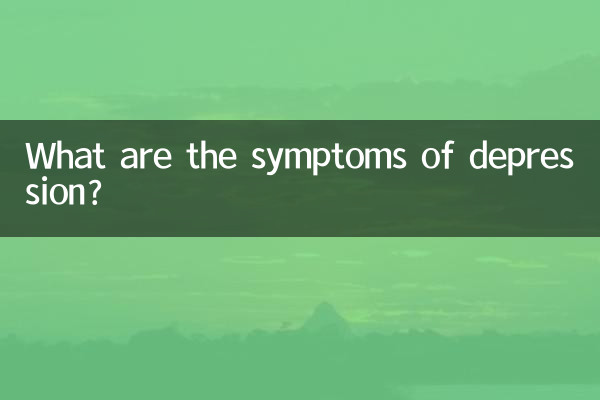What are the symptoms of depression?
Depression is a common mental health problem that has received widespread attention in recent years. With the increase in social pressure and the accelerated pace of life, the incidence of depression is increasing year by year. Understanding the symptoms of depression can help with early detection and intervention. This article will combine the hot topics and hot content on the Internet in the past 10 days to conduct a structured analysis of the main symptoms of depression.
1. Emotional symptoms

The most obvious manifestation of depression is persistent low mood. Patients may feel sad, empty, or hopeless, which often lasts for more than two weeks and is difficult to relieve through self-regulation.
| emotional symptoms | Specific performance |
|---|---|
| Continuously depressed | Feeling sad and empty for a long time |
| Loss of interest | Loss of interest in activities that you used to enjoy |
| irritable | Even small things can trigger intense anger |
| hopelessness | feeling pessimistic about the future |
2. Cognitive symptoms
Depression can affect a patient's way of thinking and cognitive abilities, leading to problems such as inability to concentrate and difficulty making decisions.
| cognitive symptoms | Specific performance |
|---|---|
| decreased concentration | Difficulty concentrating on tasks |
| memory loss | often forget things |
| self-blame | Blame yourself too much |
| negative thinking | Always think of the worst outcome |
3. Behavioral symptoms
People with depression may also experience significant changes in behavior, which often affect daily life and work.
| behavioral symptoms | Specific performance |
|---|---|
| social withdrawal | Unwilling to interact with others |
| decreased activity | Lying or sitting all day |
| Decreased work efficiency | Completing tasks becomes difficult |
| self-injurious behavior | In extreme cases it may occur |
4. Physiological symptoms
Depression not only affects the psychological state, but also causes a series of physical symptoms.
| Physiological symptoms | Specific performance |
|---|---|
| sleep disorders | insomnia or excessive sleeping |
| changes in appetite | Overeating or loss of appetite |
| body pain | Unexplained headaches, back pain, etc. |
| Fatigue | Even rest can't relieve it |
5. Time Dimension Symptoms
Symptoms of depression often change over time, and understanding these changes can help determine the severity of the condition.
| time dimension | Symptom characteristics |
|---|---|
| Early stage | Slight depression, occasional insomnia |
| medium term | Persistent low mood and loss of interest |
| later stage | Severe depression, possibly with suicidal thoughts |
6. Differences in symptoms among special groups
The manifestations of depression may vary among different groups of people and require special attention.
| Crowd category | special performance |
|---|---|
| teenager | Irritability, academic regression, rebellious behavior |
| elderly | Mainly memory problems and physical discomfort |
| postpartum women | Lack of affection and excessive anxiety about the baby |
7. How to deal with depression
If you or someone close to you has the above symptoms, it is recommended to:
1. Seek professional help, psychological consultation or treatment promptly
2. Establish healthy living habits and regular work and rest
3. Increase social activities and avoid isolation
4. Proper exercise can help improve your mood
5. Learn stress management techniques
Depression is a treatable condition, and early identification and intervention are crucial. Hopefully this structured analysis will help you better understand the presenting symptoms of depression. If you have any questions or need help, please contact a professional medical institution in time.

check the details

check the details